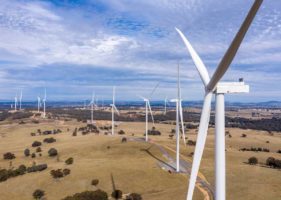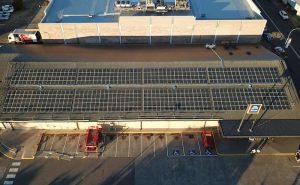The Clean Energy Regulator anticipates continued strong growth for Australia’s clean energy and voluntary carbon offset markets, as corporate commitments continue to underpin new investments, but the industry remains cautious in light of ongoing investment headwinds.
In its latest Quarterly Carbon Market Report, the Clean Energy Regulator said that the federal Renewable Energy Target (RET), which aims to add 33,000GWh of new renewables generation, was formally met in January this year with sufficient generation from accredited generators.
Despite the target being met, the cost competitiveness of new wind and solar projects is likely to see the market continue to grow beyond 2020, and the Clean Energy Regulator sees corporate commitments to renewable energy helping to drive demand for Large-scale Generation Certificates.
The Regulator noted that commitments from major energy users, including Australia’s three largest supermarket chains, would help spur additional demand for renewable energy certificates, even after the formal requirements of the federal RET have been met.
“Quarter 1 2021 saw supermarket giant Coles Group commit to a target of net-zero emissions by 2050. With this announcement, the three largest supermarket chains in Australia – Coles Group, Woolworths Group and ALDI Stores – have now committed to and set strategies for achieving net-zero status by 2050,” the report says.
A recent report published by BloombergNEF found that there had been a slowdown in new investment commitments for new wind and solar projects in Australia – including no new investment commitments for wind projects – as investors grapple with lower wholesale electricity prices and grid connection difficulties. The Regulator acknowledged that while investment commitments have slowed, there remains a strong pipeline of projects under construction.
The Clean Energy Council echoed similar concerns about the lack of new investment commitments, saying that investor wariness remained after an extended period of federal government attacks on renewable energy policies.
“The clean energy industry can and is willing to deliver the large-scale projects that can ensure reliable and low-cost energy, keep the lights on and do the heavy lifting on Australia’s emission reductions,” Clean Energy Council chief Kane Thornton said.
“Quarterly Carbon Market Report – March Quarter 2021 shows that no major large-scale renewable energy project reached financial close. Additionally, there was a 76 per cent reduction in the amount of large-scale renewable energy completing installation compared to the same quarter in 2020.”
“The challenges concerning grid connection combined with the continued political division, lack of clear targets and policy and unpredictable government interventions are all creating unacceptable levels of risk for investors. This is obviously having a flow-on effect with a reduction in jobs – particularly in rural and regional Australia, where these projects are generally located,” Thornton added.
But the Clean Energy Regulator said that it was still optimistic that, at least in the short term, that construction activity would remain strong.
“The Clean Energy Regulator maintains an expectation of between 2 and 3 GW of large-scale renewables capacity reaching financial close in 2021. This is a similar level to 2020. The downside risk to this range is the difficulty, time and costs in getting connection approvals which may delay projects reaching financial close,” the report says.
“While the number of projects reaching financial close this quarter was modest, the pipeline of large-scale projects with a power purchase agreement, which is a leading indicator, reached a record 3.7GW over Quarter 1 2021. This suggests that investment in 2021 and beyond should remain strong,” Clean Energy Regulator chair David Parker added.
The 2020 year recorded surprisingly high growth in the rooftop solar market, and the Regulator saw the market remain strong in the early months of 2021, with the regulator recording 792MW of new capacity additions through rooftop solar – a 28 per increase on the first quarter of 2021. The Regulator expects this growth to remain strong throughout 2021, with between 3,500MW to 4,000MW of new rooftop solar installed.
“Rooftop solar has continued to show strong growth in Quarter 1 2021 with 792 MW installed – a 28 per cent increase compared to the first quarter of 2020. We expect the combined capacity of rooftop solar across small and mid-scale installations could exceed 4 GW capacity in 2021,” Parker added.
The Regulator estimated that through the schemes it administers, which includes the RET, the Emissions Reduction Fund and the Safeguard Mechanism, were responsible for a combined 57 million tonnes in 2020, a 7 per cent larger reduction than that recorded in 2019.
The Regulator also noted a significant uptick in the number of voluntary purchases of Australian Carbon Credit Units (ACCU), with growing corporate demand for carbon offsets as companies look to fulfil commitments to reduce their emissions footprints.
“Announcements of corporate commitments to reduce emissions continued in Quarter 1 2021 with supermarket giant Coles Group committing to net-zero emissions by 2050. Along with Woolworths Group and ALDI Australia, all large supermarket chains in Australia now have an emissions reduction target,” the report says.
“Voluntary private and state and territory government demand for ACCUs totalled 174,000 in Quarter 1 2021, a 52% increase on the 115,000 ACCUs cancelled in Quarter 1 2020. Surrenders from Climate Active participants increased by 67% in this quarter compared to Quarter 1 2020, with 117,000 ACCUs.”
RenewEconomy acknowledges the passing of Chloe Munro, the inaugural chair of the Clean Energy Regulator, who passed away this week. Ms Munro led the establishment of the Clean Energy Regulator and has been recognised for her leadership through several senior clean energy leadership positions.









